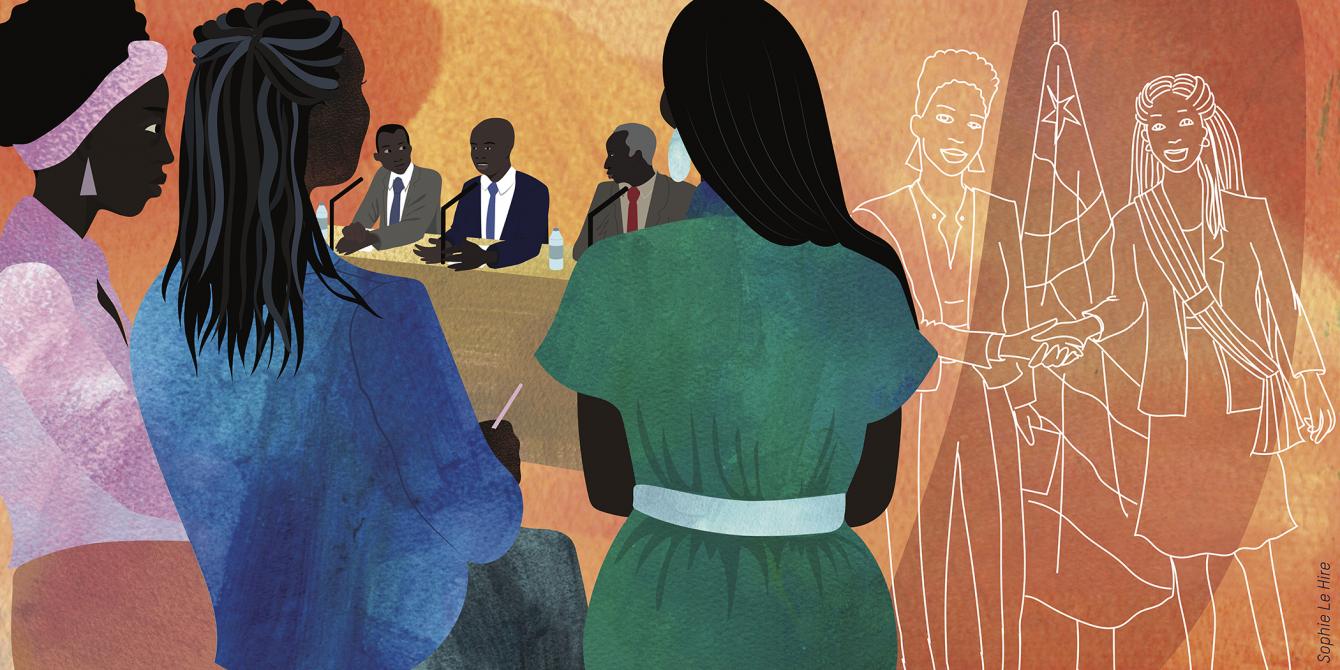The Day We Will Dance: Rosalie in the Central African Republic

The series The Day We Will Dance is illustrated by the artist Sophie Le Hire
I am Rosalie Kobo-Beth from the Central African Republic (CAR), Secretary-General of the Association of Central African Women Lawyers, and spokesperson for the platform for young women ‘I Londo Awè’ (“We are already standing”, in Sango). I’m 33, I’m single and have two children.
With ‘I Londo Awè’, we fight for women to be at the heart of the peace process in CAR, by seeking parity within the Truth, Justice, Reparation and Reconciliation Commission.
With the appearance of the coronavirus, we have been campaigning since March for accompanying measures to be put in place following preventive measures taken by the government to contain the spread of the virus.
CAR is a landlocked country with advanced poverty. With COVID-19 in addition, everything gets worse! The closing of borders and measures of social distancing cause prices to rise. Soap is more expensive (increased from 150F to 250F), just like the taxi (250F instead of 150F) because you can only be three people at most in the vehicle.
So with I Londo Awè, we are campaigning to help vulnerable populations, especially women, to be helped. It would be a good thing if everyone could have a handwashing kit with soap and water at an affordable price!
You know, many do not believe that the coronavirus exists in CAR. I believe it. When you arrive at my house, we greet you from a distance and we direct you to hand washing. When I go to the office, I put on my mask. And when I come home from my workday, my children say to me: "Mom, wash your hands! " I raise awareness around me.
Defending the interests of women is really important in the context of CAR, and in my personal realities. Customs and traditions weigh on women, and they cannot speak out.
I myself have been marginalized and underestimated. People think that all I care for is studying and work, and that life as a couple and family does not interest me. As an intellectual woman, they think I don't want to start a home. It's very hard for me.
At the professional level, it's even worse. When you have a lot of responsibilities, and in addition you are single, many feel that you have a very harsh character, too harsh even. You are despised as a woman and you have to defend your honor, this is not normal.
What helps me hold on is to stay focused on my goal: to become a public figure. I hope that one day this dream will come true and that I can make big decisions to change the lives of women in my country.
Interview by Aurélie Godet, Oxfam in the Central African Republic.
Discover the other stories of the series The Day We Will Dance
Read the story of Victorine* in Burkina Faso
“The day I hear that this disease is over, we will dance."
*Name has been changed to protect the identity
Read the story of Mariam* in Burkina Faso
"Behind us, there are attacks, in front of us is the disease. How will we cope?"
*Name has been changed to protect the identity
Read the story of Halima in Niger
“Pregnant women kept falling and getting up. We have lost sight of our children."
Read the story of Tedy in Mali
Read the story of Sylvie in the Central African Republic
Introduction and creative process
Your donation will be processed through another Oxfam website. Please refer to their policies if you want to find out more about how your data will be handled.







 Follow us on Facebook
Follow us on Facebook Our videos on YouTube
Our videos on YouTube Follow us on Twitter
Follow us on Twitter